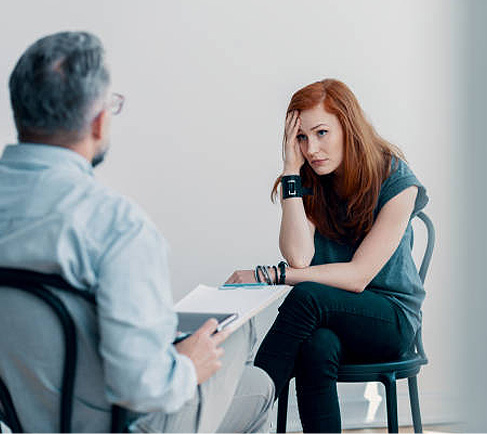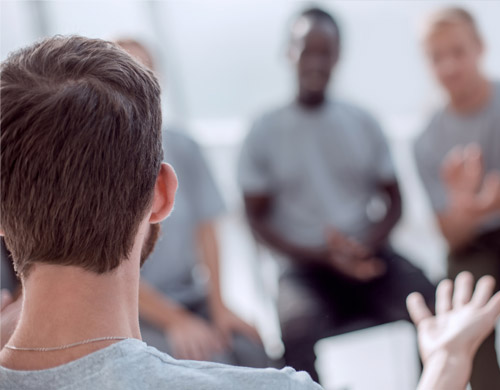You may have a preconceived idea of what someone with an addiction may look or act like. This might be someone who is untidy and unclean, has lost their job and perhaps their home, someone who begs for money on the streets, and maybe even commits crimes.
However, the truth is that many people living with addiction manage to maintain functional lives and keep their drug or drinking problem unknown for a long period of time. People with addictions hide in plain sight. There is even a chance that a loved one has an addiction but you don’t know it yet.
Most people experience symptoms of their addiction, but try their best to hide any signs of it from loved ones. No one can hide addiction forever but luckily help is available to confront and overcome it.

Deep down, you probably already have an idea if you suffer from addiction, but knowing the signs and symptoms could help to offer the confirmation you need to make a change. Admitting you have a problem to yourself and others is the first step towards getting on the road to recovery.
Why You Need to Know the Signs of Drug Addiction
Drug addiction, or substance use disorder (SUD), is where a person has a compulsive need to take alcohol or drugs. It is a medical condition that requires a formal diagnosis and specialized treatment which is primarily a detoxification that rids the body of all substance traces. You should never detox without professional supervision as this can be dangerous.
People with addictions are often in denial about the extent of their problems. They are often reluctant to admit they need help due to social stigma and their disease not wanting them to cease substance abuse. Knowing the signs of drug addiction can allow you to encourage a loved one to get the help they need.
Anyone can have problems with drug use and this should always be addressed and taken seriously, whether it is a true addiction or not. Support is available no matter what and you should always seek help if you have concerns. Early intervention offers a better prognosis in recovery.
If you spot signs of drug addiction in someone, do not panic. Understand that addiction is not a moral failure and they are not doing this to hurt you. It is important to only address your concerns about their drug use when they are sober, such as in the mornings, and when you are feeling calm and collected. Instead of being confrontational, encourage and support them to seek help.

The Tell-Tale Signs of Drug Addiction
It is often very difficult to tell if someone has a drug addiction. This is because many people with addictions don’t want to be found out and go out of their way to stay off the radar.
Being informed could help you to spot signs of addiction in a loved one and encourage them to get help sooner rather than later. Here are some tell-tale signs that a loved one has a drug addiction:
- Changes in personality
- Changes in mood and behavior
- Changes to appearance such as blood shot eyes or weight loss
- Finding any excuse to drink or take drugs such as prescription painkillers
- In denial of drug use and defensive when questioned
- Alcohol containers or drug packets/paraphernalia lying around
These signs do not necessarily mean that someone has a drug addiction, and there is no need to jump to conclusions over a singular sign such as weight loss or low mood. However, one or more of these could indicate addiction, and it is worth keeping an eye for further signs.
Behavioral Signs of Drug Addiction
As addiction is a brain disease, it changes a person’s mood and behavior. You might not realize that your addiction has changed your mood or behavior, but other people may pick up on it.
If you are wondering whether a loved one has a drug addiction look out for these behavioral signs:

- Mood swings
- Low mood
- Low self-esteem
- Anger
- Outbursts
- Lying
- Defensiveness
- Secretive behavior
- Poor judgment
- Risk taking or unlawful behavior
- Memory problems
- Stealing money, possessions, or substances
- Isolating from friends and family
- A lack of consideration for others
A person with addiction is controlled by their brain’s desire for drugs and this becomes their number one priority above anything and anyone else including work, hobbies, or even friends and family. This is how addiction can break trust and ruin a person’s relationships and reputation. There is no end to how destructive this disease can be.
Do You Need Help?
Together, we can build up your confidence and you can regain control over your life!
Contact us now to ask about our addiction and abuse treatment programs now!

Mental Health Symptoms of Drug Addiction
Drug addiction takes its toll on a person’s health and well-being. In addition to physical symptoms, people also often experience mental symptoms.
Mental health disorders and substance use disorders are commonly co-occurring. In fact, studies have found that over half of people who have an SUD will also experience a mental health disorder.
People often use substances to mask issues related to mental illness. Self-medicating with alcohol or drugs is always a bad idea and risks a variety of health issues, including addiction. Addiction itself can exacerbate existing mental health issues.
Some common mental health symptoms of drug addiction include:
- Anxiety
- Depression
- Paranoia
- Hallucinations
- Sleep problems including insomnia
- Psychosis
Many treatment programs are personalized so you can work on any existing mental health issues alongside addiction recovery. Good mental health is essential to successful recovery.
Physical Symptoms of Drug Addiction
A person suffering from drug addiction will almost always have physical symptoms, even if they show no signs from the outside. Alcohol and drug abuse takes its toll on the body, even in the short term. In the case of prolonged substance abuse, this can cause serious health consequences.
Common physical symptoms of drug addiction include:

- Bruises and scabs if drugs are administered by needle
- Chronic nose bleeds, runny nose, and nasal problems if drugs are snorted
- Stomach ache and diarrhea
- Nausea and vomiting
- Fatigue
- Sleep problems such as insomnia
- Weight loss or gain
- Increased drug tolerance
- Cravings
- Withdrawal symptoms if you stop taking drugs for a period of time
These physical symptoms are signs that you have a true addiction, rather than just an abuse problem. The only way to relieve your body from physical symptoms of addiction is to rid your body of substances through a medical detox.
Is Your Loved One Self-Medicating?
Did you know that mental illness commonly co-occurs with addiction? One reason for this is because people often mask difficult emotions with mind-altering substances such as alcohol or drugs.
This is known as self-medicating and doing this for a prolonged period of time can result in addiction and other health problems. Neither alcohol nor other drugs can help with symptoms of mental illness which should be treated appropriately by a medical professional. Complications of self-medicating with substances include:
- Worsened existing symptoms that led to self-medicating in the first place
- Drug tolerance
- Short term side effects
- Long term health problems
- Addiction
- Overdose
- Death
If you think that a loved one is self-medicating with substance, you can encourage them to seek help for their mental health. Suitable treatments include some medications and therapy such as cognitive behavioral therapy (CBT). It is important to learn healthy coping skills for your mental health rather than self-medicate. Failing to do so can jeopardize addiction recovery.
You can get help for any mental health problems alongside your addiction treatment. Many rehab facilities offer personalized treatment programs so you can get the right care for you.

Are They ‘Doctor Shopping’?
Doctor shopping is known in the addiction world as a practice in which you visit multiple medical doctors in order to get multiple prescriptions. This is done in a way that each prescribing doctor does not know that the person has obtained medication from another prescriber.
A loved one might be doctor shopping if you spot any of these signs:
A person might sign up to many health care providers as a ‘new patient’ and lie about or exaggerate symptoms with the hope of getting their desired drugs. This is often done when a person has an addiction to prescription medication such as opioids, amphetamines, or benzos.
Sometimes doctor shopping happens so a person can sell drugs, but most often these drugs are for personal use to fuel an addiction to prescription medication.
- They have a large stash of prescription drugs
- They finish their prescribed medication earlier than is expected
- They have the same prescriptions from different doctors
- They complain about medications not working
- They seem to visit doctors often despite nothing being wrong
- They fake illness often
- They cross state lines to visit doctors
Most people with prescription drug addictions gain a physical dependency through legitimate use. This is why it is important to only take the prescribed drug dose and for the stated amount of time only.
Many prescription drugs are highly addictive and have potential for abuse. Due to this, prescription opioid abuse is considered an epidemic, with millions of people worldwide suffering from opioid use disorder (OUD). Addiction to benzos is sadly going the same way.
Signs of Abuse Related to Specific Drugs
While there are general signs of drug abuse, here are some signs relating to specific drugs that you can look out for.
Heroin
Needle marks on arms, constantly rolled-down sleeves, finding burned spoons or syringes, or scraps of aluminium foil.
Cocaine
Dilated pupils, teeth grinding, dry mouth, high energy, rapid speech, weight loss, needle marks on arms, chronic nose bleeds or runny nose.
Crack Cocaine
Dilated pupils, finding glass pipes, bruised or blistered lips that have come into contact with a hot crack pipe, high energy, rapid speech, erratic behavior.
Benzodiazepines
Irritability, mood swings, mental confusion, disorientation, muscle weakness, drowsiness, slurred speech, nausea, loss of appetite.
Legal opioid medications
Regularly taking opioids, taking opioids ‘just in case’, borrowing medication often, poor judgment, mood swings, slurred speech, changes to sleep patterns.
Information about specific drug abuse can be useful so you know what you are up against and can get the right treatment.
If you or a loved one have the signs and symptoms of drug addiction, it is important to seek professional help. Your best bet is to talk to a treatment facility where you can receive appropriate care and support. Remember that people can and do recover from drug addiction, and so can you.





